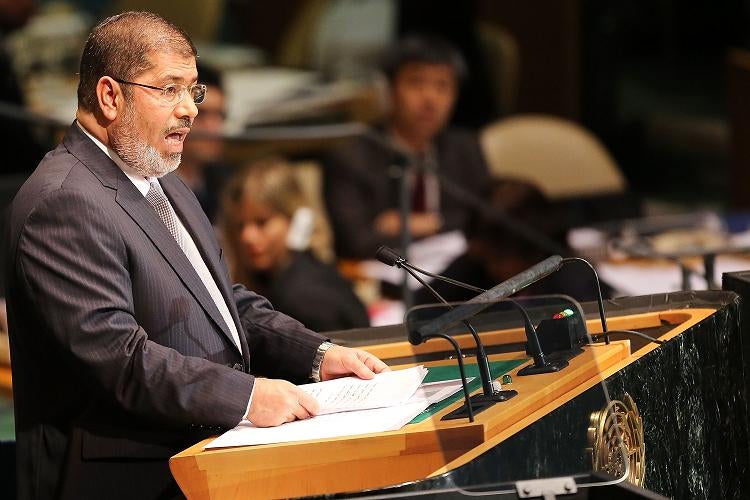Egypt's President Morsi is in an impossible position in relation to Israel's aggression in Gaza
Either he imposes his will on the Israelis, keeps his powder dry and risks his reputation as the guarantor of Muslim freedom in the region. Which will he choose?


Yes, the Muslim Brotherhood mastered the art of local politics, built a formidable propaganda machine and deservingly cashed in on their social investments with victory in the Egyptian elections. But there was always an accident in waiting. Israel.
We all knew President Morsi’s policy in the region was going to be driven by pragmatic calculations of trade and geopolitics, but the latest act of Israeli aggression in Gaza challenged the durability of that approach. Not only is it fuelling much fury and desperation in Egypt, but the government’s promise of being a safety net for Palestinians has been firmly called into question. Without being too critical of the Egyptian President, he did recall Egypt’s ambassador from Tel Aviv with immediate effect, appealed to the Arab League to mediate the situation and to an extent, upped the diplomatic ante on Israel.
But I’m not sure insisting on diplomacy and multilateral efforts will cut much ice with ordinary Egyptians, who are now reflecting whether their government’s claim of being an effective buffer against Israel was more a pipe dream than a realistic scenario.
Quandary
Even before he came to power, Morsi was aware that the moment Israel began flexing its muscles, Egypt could be landing itself in uncharted territory. Calls for him to chart an independent course in any conflict involving Israel, even if it meant flirting with the idea of amassing troops on Israeli border zones, would reign in thick and fast. Now, the Egyptian President is in a deep rut over Israel. He either rides the mounting political demands of his countrymen and imposes his will on the Israelis, or keeps his powder dry and risks his reputation as the guarantor of Muslim freedom in the region.
Morsi’s political quandary doesn’t end there. Elements within the Muslim Brotherhood are marred with division and there is no settled consensus on how the party ought to settle their score with Israel. The historical rift between the Brotherhood’s pan-Islamists and pan-Arab nationalists are yet to be bridged, with the former preferring a hard-line stance against Israeli aggression, and the latter content with leading from behind. And although the President has proved resilient to internal revolt, showing no signs of imploding thus far, old wounds have yet to heal and a proxy contest for control continues.
Morsi’s measured response to the flare up so far may be part of a multi-pronged strategy to foster a pacific international image amidst Egypt’s deteriorating security situation, and one which denies SCAF any window of opportunity to exert itself, which the President can ill afford. But in the process, he could alienate the more gung-ho factions of his party and set himself at loggerheads with his Islamist constituency, however dwindling a segment they may be.
Judging by the mood of protesters in Cairo and Alexandria, the President’s drearily familiar response to the conflict has not garnered sympathy from the Arab street. For everyday Egyptians, Palestine is no peripheral state. An attack on Gaza is an attack on them, which explains why a strong momentum is building for the Egyptian government to send a thunderclap of authority across the border. The popular feeling is that issuing ringing declarations of support for the Palestinians will do little to placate war-hungry Netanyahu and deflect Israel from the conflict it craves.
Rapprochement
What’s also clear is that anti-Israeli sentiment cuts right through Egypt’s sectarian maze, so the Brotherhood’s political fortunes depend not only on whether it can appease its Islamist strand, but also whether it can meet the rising expectations of ordinary Arabs, many of whom are happy to be locked into the struggle for Palestine’s future. If government ministers remain ambivalent about Egypt’s regional presence, I can see the pendulum easily swinging in favour of the more ultra-conservative religious right, who would gladly if given the chance, funnel cash and weapons to occupied Palestinians.
But having already courted the US government and insisting on the normalisation of bilateral relations with Israel in the past, Morsi is likely to stray far from suggestions that he adopt a more aggressive regional stance. If he crafts his message to strike a loud chord with those favouring military solutions over diplomacy, it could potentially stymie his presidential mission, still at its infancy.
For Morsi, the moral urge to intervene in Gaza and tighten the screws on Israel conceals more important, underlying factors. If the past few days are anything to go by, he will try everything in his means to prevent the crisis from morphing into a political standoff and reach tipping point.
Rapprochement with Netanyahu is unlikely to compromise Egypt’s fragile security, which for Morsi, is a safer option than diverging from the script and pinning hopes on a showdown with Israel, which could have unintended consequences.

Join our commenting forum
Join thought-provoking conversations, follow other Independent readers and see their replies